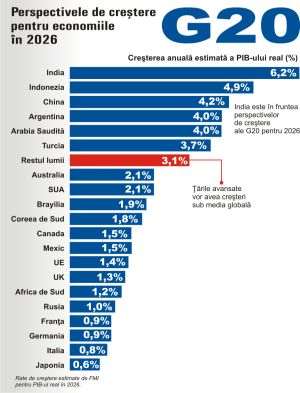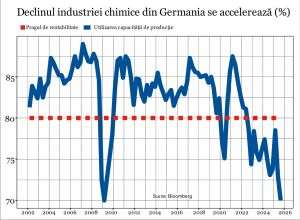• (Interview with Crinuţa Nicoleta Dumitrean, the chairman of the National Authority for the Restitution of Properties)
Reporter: How many compensation cases are on the waiting list of the ANRP?
Crinuţa Nicoleta Dumitrean: So far the Cash Compensation Department of the ANRP has recorded 22,058 files with options (ed. note: compensation), of which approximately 13,700 cases are close to being solved.
Referring to the requests for options that concern the receiving of shares, I want to inform you that the afferent conversion deeds were issued to all the people that requested it.
So far, the National Authority for the Restitution of Properties issued 5,778 conversion deeds. All of them were sent to the Central Depository in order to be recorded in the Shareholder Registry of the Proprietatea Fund.
Reporter: What happens if the compensation requests exceed the size of the stake that the state still has in the Proprietatea Fund?
Crinuţa Nicoleta Dumitrean: The state can increase the share capital of the Proprietatea Fund by contributions in cash or in kind.
According to the Law no. 247/2005, "The Authority for the Recovery of the State"s Assets (AVAS) can transfer to the Proprietatea Fund, by way of a delivery protocol and without consideration, the right of ownership of additional blocks of shares apart from the ones mentioned in the appendix, to the extent that the AVAS holds or will hold a stake in the share capital of the companies in the appendix, other than the one already transferred to the Proprietatea Fund".
It is worth mentioning that the compensation are not only awarded in the form of stock in the Proprietatea Fund, as those who are entitled to compensation can also opt for cash.
According to the legislation in effect, the beneficiary of the compensation decision can opt for shares of the Proprietatea Fund, compensation in cash, within a limit of 500,000 lei, or for compensation in stock and in cash (ed. note: starting in July 2010, the state has put the offering of cash compensation on hold for a period of two years).
Reporter: When will the process for the compensation of former owners end?
Crinuţa Nicoleta Dumitrean: It is difficult to state a certain date for that, since its completion depends on the solving of all the petitions, namely of the requests by the vested entities (in many cases, the files take a long time to solve due to the fact that the necessary paperwork is missing), as well as the financial resources that the state would need to offer compensation in cash.
In spite of all this, given the complexity of the restitution process, the ANRP is carrying out all the due diligences to speed up the restitution process and the awarding of the compensations owed to the individuals who are entitled, within a reasonable delay, according to the practice of the European Court of Human Rights.
Reporter: Who is overseeing the compensation process?
Crinuţa Nicoleta Dumitrean: The compensation process, which uses a special procedure regulated by the VIIth chapter of the Law no. 247/2005, involves several entities which are vested with the role to solve the notices/requests submitted on the grounds of the special laws intended to provide reparations.
The ANRP is a specialized institution of the central public administration, controlled by the Ministry of Public Finance, with its main purpose being to handle the process of restitution and compensation for former owners whose assets were seized by the communist regime, on a national level, and to coordinate and oversee the application of the legislation in effect.
In the first stage, the oversight and methodological guidance activity is carried out by the overseeing body of the National Authority for the Restitution of Properties. In the case of mayoralties, this oversight can also be carried out by the Control Body of the prefect.
The Office of the Control Body of the National Authority for the Restitution of Properties and the Control Department of the Department for the coordination and control of the application of legislation pertaining to the restitution of real estate properties operate on the grounds of the Law no. 10/2001, republished, and on the grounds of the land legislation.
The laws in effect involve two steps of the compensation process, namely the stage of the first solving the complaints and the stage of awarding the compensation in cash or in shares in the Proprietatea Fund.
The amount of the compensation will be done by the Central Compensation Commission, on the basis of the evaluation reports drawn up by the real estate evaluators certified by the ANEVAR (National Association of Real Estate Evaluators), and the compensations are paid out by the National Authority for the Granting of Compensation in Cash.
• The Peleş estate was returned to King Mihai in 2007
The Peleş and Pelişor castles, together with the afferent lands, were returned to King Mihai on March 1st, 2007. According to the Memorandum concluded at the time between the Romanian Government and the Royal Family, the owner pledged to turn the Peleş museum into a museum of the Romanian state, in exchange for the payment of a certain amount, and pledged not to lay any further claims against the movable assets of the Peleş Castle. Thus, the collections of the Peleş remained in the castle, in exchange for the payment of rent and were still accessible to visitors, but the initial contract concluded between the Government and the Royal House expired in March 2010.
In the beginning of the year, the representatives of the Royal Family and the Commission which represents the Romanian state in the negotiations to extend the rental contract for the Peleş castle by three years, and to continue hosting the art collections within the castles, thus keeping the Peleş National Museum open.
The two castles and the afferent land were returned to King Mihai Ist, following a decision signed by the Minister of Culture and Cults, Adrian Iorgulescu. The decision solved the request the Royal Family had submitted on August 8th, 2001. The restitution of the two castles and of the afferent plots of land was made on the grounds of the Law 10 of 2001. Based on the aforementioned law, King Mihai, acting through princess Margareta, requested the restitution in kind of the Peleş estate of Sinaia and all its auxiliary buildings. At the time, it was speculated that 30 million Euros were paid by the Romanian as compensation.












































1. Engleza de balta
(message sent by daniel on 31.01.2011, 11:41)
mah, sunteti cam prosti! ar trebui sa mai invatati engleza si apoi sa traduceti. unde plm ati terminat (daca ati terminat) jurnalismul? la IDDDDDDDDDDDd